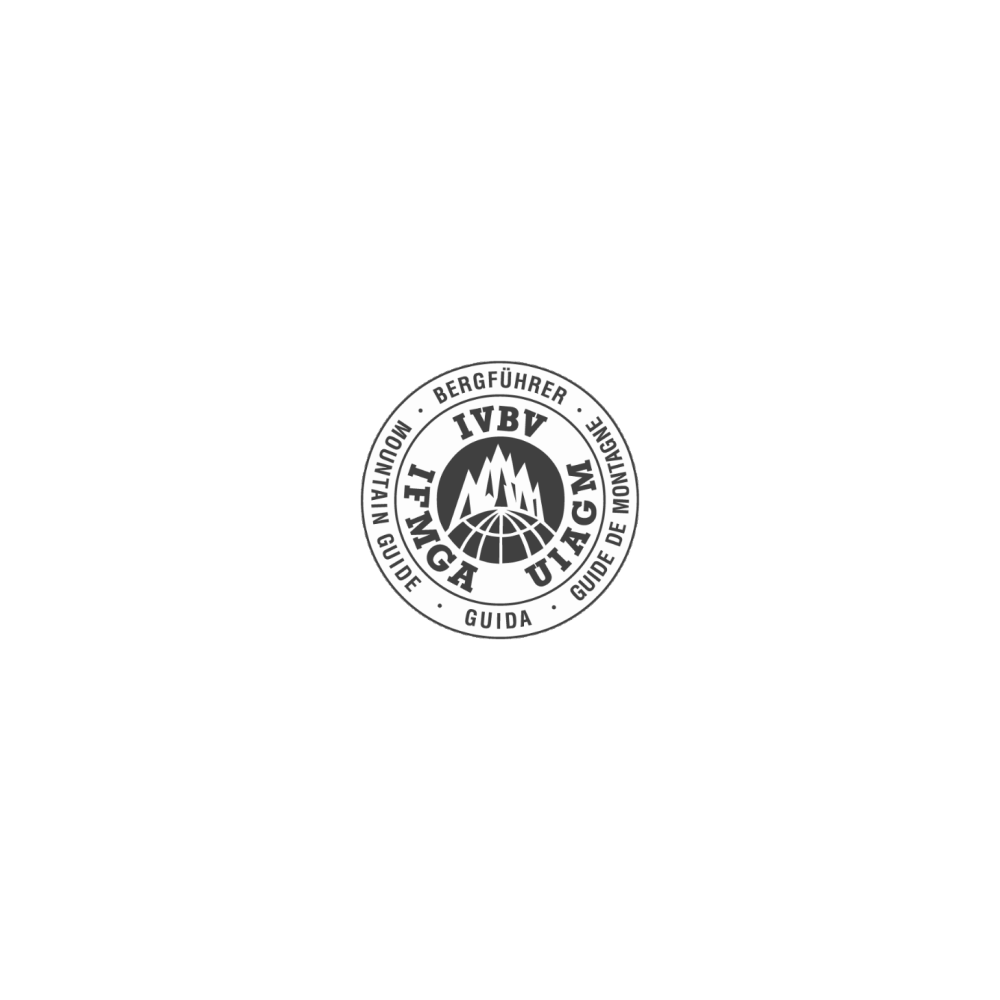The rock rescue Systems Course
LEARN THESE VITAL RESCUE TECHNIQUES
The Outdoor Rock Rescue Systems Course will provide many benefits from learning the tools and systems presented in this course, organized in partnership with our friends at The Calgary Climbing Centre. This Rock Rescue course will help increase your confidence and knowledge of ways to get out of situations many climbers find themselves in. Fallen leaders, stuck ropes, injuries, and weak seconds can all cause problems when attempting a climbing objective. This course will help you overcome some of these challenges.
This specialty course includes 2 full days of outdoor climbing, with instruction on rescue techniques from above and below. Some of the skills learned include escaping the belay, raising an injured climber, passing a damaged section of rope, as well as rope ascending and lowering options for individuals and teams.
LEARN THE TECHNIQUES WITH LOW GUIDE : GUEST RATIOS
MAY TO SEPTEMBER
ITINERARY
day 1
TOP-DOWN ROCK CLIMBING RESCUE TECHNIQUES
Typically located at rock climbing venues in Kananaskis Country or near the Banff Townsite, our first day will focus on what we call "top-down rescue". The day will focus on the skill sets required to provide assistance to a climber who is located below you. These skill sets then become the foundation for moving onto Day 2. Skills you'll learn:
- Review steps and procedures for initiating an external response from professional rescue teams (National Parks / Alberta Parks Visitor Safety Teams)
- Discuss potential hazards and the inevitable increases in risk levels tied to responding to an incident yourself. Learn to recognize where these hazards exist and to consider the acceptability of these increases in risk levels to you as the rescuer
- Review anchor construction
- Review a variety of belay methods (direct anchor belay, redirected belay, fixed point belay)
- Learn to "escape the belay" by transferring the victim/load directly to an anchor above, freeing you from the system
- Learn a variety of raise/hauling systems (3:1 Direct Haul as a baseline)
- Learn a variety of lowering methods with backups/failsafes
- Learn the counterbalance rappel - a method for descending short distances while "carrying" a victim
- Learn tandem rappel and carry techniques to manage and descend with either conscious or unconscious victims
- Learn to seamlessly move from raise/haul into lowers and/or tandem rappels, and to interchange seamlessly between each system as changes in circumstances require
DAY 2
BOTTOM-UP ROCK CLIMBING RESCUE TECHNIQUES
Our second day focus is to build on, and apply in tandem, the new skills taught on Day 2, which allow a rescuer located below a victim to ascend to the position of the victim, create secondary anchorage, secure the victim, and consider the next steps; whether further movement will be required and how (raise/hauling, lowers, tandem rescue rappels). Specific skills learned include:
- Hazard assessment process prior to beginning an ascent to a victim overhead (we teach this on high-integrity protection only - i.e., bolts)
- Transferring the load of a victim above to the anchor
- Techniques for ascending a loaded rope above your anchor
- Arriving at your victim: defining your priorities (first aid? build an anchor?)
- Secondary anchors
- Transferring an unconscious victim to secondary anchors using "short haul" systems
- Transferring an unconscious victim off a secondary anchor and into raise/haul, lowering, or tandem rescue rappel systems
Once the skills above have been practiced and delivered, your Guides will begin moving onto providing scenarios to practice and challenge our ability; to use all learned tools and skill sets to solve a given problem or scenario.
There are different views on the idea of "training to failure". This is something we believe in and will challenge you on during the course if you allow us to. Failure in this course context is simply running into what we believe to be an "unsolvable problem" in the moment. These scenarios provide two useful perspectives: they show each of us where our competencies in applying the systems lie and, in addition, provide areas for training focus in future practice.
Logistics
Logistics to consider ahead of your Rock Rescue Systems Course:
-
ACCOMMODATION:
Most students find it best to drive out to join us the morning of the course days. However, if you're looking to get a little closer to our field day location beforehand, we would suggest the following accommodation options in Canmore, Banff & Lake Louise.
-
BANFF
BUFFALOBERRY LODGE -
LAKE LOUISE
CANADIAN ALPINE CENTRE
THE POST HOTEL
-
TRIP FOOD & MEAL PROGRAMS:
- Students are responsible for their own meals during the Rock Rescue Systems Course.
- Students are responsible for their own meals during the Rock Rescue Systems Course.
-
TRANSPORTATION:
- Students are responsible for their own transportation on the course.
- Students are responsible for their own transportation on the course.
-
NATIONAL PARK ENTRY PASSES:
- Students are responsible for obtaining a National Park entry pass for their field days if required (Banff National Park) or to have their vehicle registered for a Kananaskis Conservation Pass.
REQUIRED EQUIPMENT
The following is a Gear, Clothing, and Equipment list. You will be required to arrive with these items on the course. Feel free to bring as much of your own gear and equipment as you would like to review and use on the course.
- Water Bottle or Collapsible Water Bladder (1L min.)
- Rock Shoes
- Chalk bag*
- Harness*
- Sunglasses
- Sunscreen (min. SPF 50+)
- Camera, batteries, memory cards & accessories (optional)
- Daypack (at minimum, 1 x 35-40L backpack. In addition, a 30L option may be appropriate for some days)
*NOTE* - All technical equipment not listed above such as belay devices, quickdraws, ropes, slings etc. will be packed out and provided by us for you on your program. Feel free to bring as much of your own gear to use as you'd like, and your Guide will review it with you when you arrive on course.
ITEMS ON REQUEST - Items above noted with an (*) are available on request for your course.
ESSENTIAL CLOTHING
- Softshell Jacket
- Gore-Tex Jacket (for wet weather days only)
- Gore-Tex Pant (for wet weather days only)
- Buff Style Neck Tube / Headband
- Sun Hat (ball cap or full brim bucket style)
- Thin Insulated Gloves (multiple pairs [3 min] for rope work)
- Approach Shoes or Trail Runners (no need for heavy hiking boots, unless specifically requested by your Guide based on route or seasonal conditions)
OTHER
- Lunch
- Water
TRIP CANCELLATION & INTERRUPTION INSURANCE
The best method to protect your investment with us should unforeseen arise, requiring you cancel your booking, is to purchase a Trip Cancellation & Interruption Insurance Policy.
Lifestyle Insurance has covered many of Cloud Nine Guests on trips all over the world, and we have first-hand experience seeing these policies activated by our Guests.
Safeguard your trip costs and investment with us. Request a Quote from Lifestyle Financial.
Is this coverage required?
- For Canadian Residents, coverage is suggested but not required to register.
- For Non-Canadian Citizens, coverage is suggested but not required. It is strongly suggested that your policy includes Emergency Medical Coverage, unless you carry an alternative policy which will respond in the event of medical emergency.
WAIVER - Release of Liability & Indemnity Agreement
Prior to booking you will be required to acknowledge that you have been provided a copy of our Waiver of Liability Agreement for your review. All participants, or their legal guardians wishing to participate on any Cloud Nine Programs, must acknowledge that they have been presented this document, have read it in its entirety, and understand the agreement being entered into by signing. While there is no obligation to enter into this agreement with us, it is a condition of our service provision.
Booking TErms & Conditions
Before you book your course, please review our Booking Terms & Conditions. We do not accept bookings without your voluntary acceptance of these terms. Please read carefully as these terms outline specific policies and guidance for both our staff and clients with respect to refunds, cancellations, rescheduling, credit forward, refund exemptions etc.
Book A PRIVATE GROUP Lesson
For those who prefer our smallest and most focused learning environments. Private Groups can book on course dates that suit you and your crew best, and one of our ACMG / IFMGA Mountain Guides will join you on your terms. You pick the Group Size, along with a Field Day venue and date outside those listed on the calendar.
How Do We Book It?
Contact our office to confirm availability for your preferred dates. We'll provide you with a private booking link for you and your group to register either together or individually.
The Outdoor Rock Climbing Series Courses:
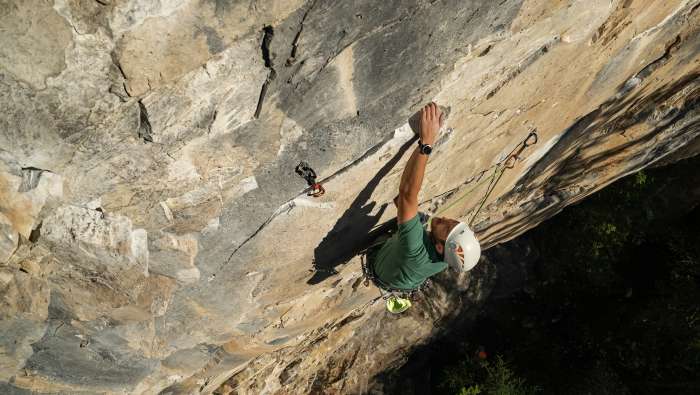
L1 - Outdoor Lead Lesson
Level 1 - Take your climbing from the Gym to the Crags. This Learn to Rock Climb Series Course is provided with our partners at the Calgary Climbing Center for $235/student.
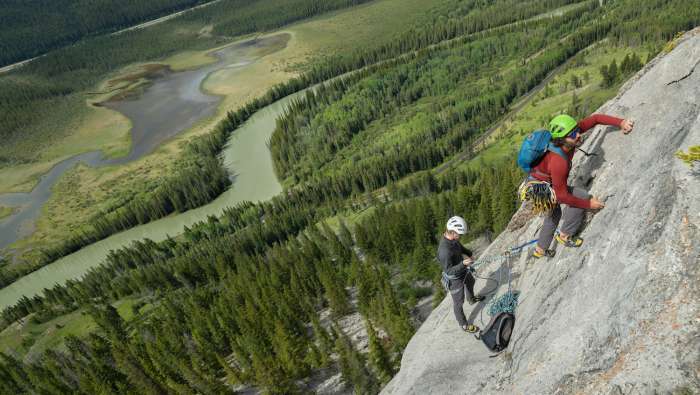
L2 - Multi-Pitch Systems Course
Level 2 - The Sport Multi-Pitch Systems Course. Get the systems and skills to safely climb the long routes for $525/student.
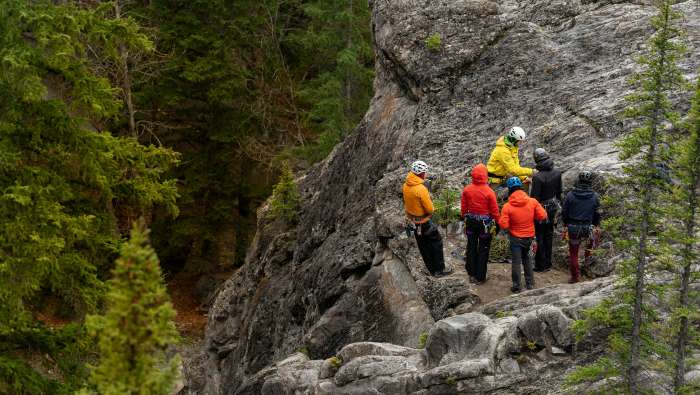
L3 - Rock Rescue Systems Course
Level 3 - Essential skill sets for climbers in both single and multi-pitch environments for $525/student.
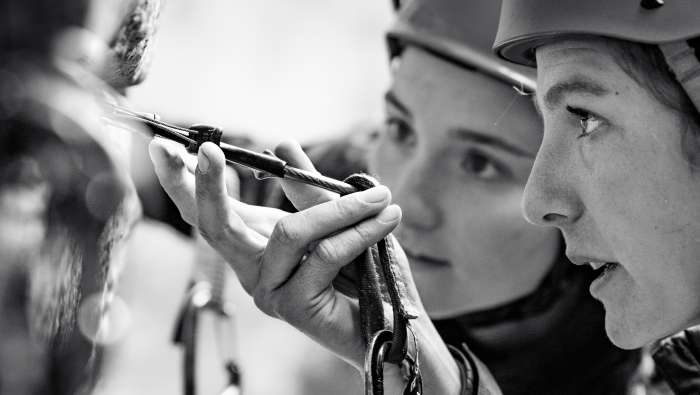
L4 - Trad Rock Systems Course
Level 4 - Learn to place high-integrity traditional and natural protection. Lead your first traditionally protected pitch with our Guides beside you all the way up for $525/student.

